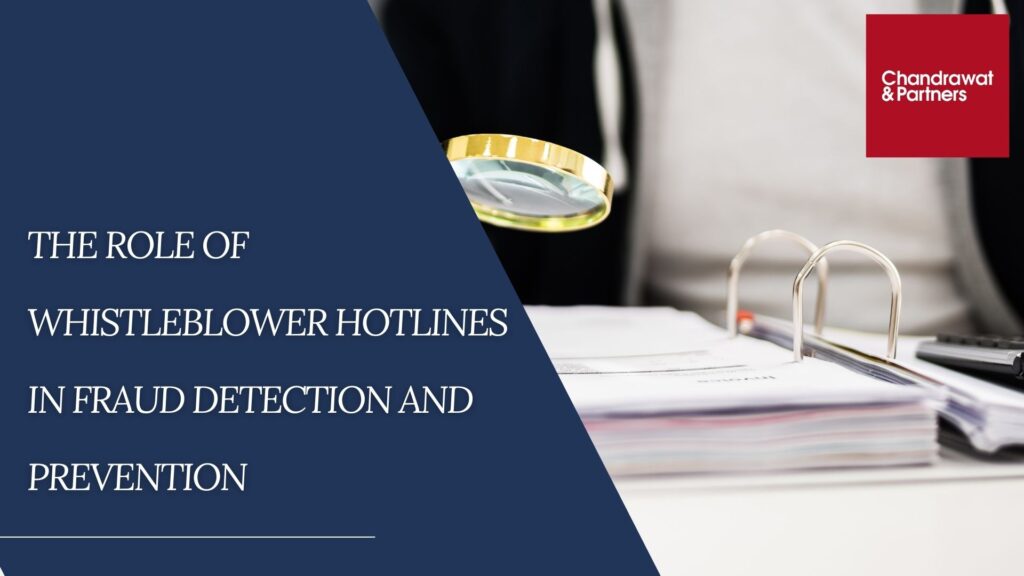In today’s corporate landscape, fraud has become increasingly prevalent, leading to substantial financial losses and damage to an organization’s reputation. To combat this pervasive issue, many businesses have turned to whistleblower hotlines as a crucial tool for fraud detection and prevention. Whistleblower hotlines offer a secure and confidential avenue for employees, customers, and other stakeholders to report unethical or fraudulent activities within an organization.
THE RISE OF WHISTLEBLOWER COMPLAINTS AND THEIR PROTECTION
The surge in whistleblower complaints highlights the importance of protecting whistleblowers and establishing a robust framework to safeguard their interests. This growth in whistleblower protection signifies an organizational tool that promotes transparency and enables effective and clear communication. Whistleblowers are individuals driven by ideals of ethics, honesty, and the revelation of truth. They are employees who feel a moral obligation to expose an organization’s unethical and corrupt practices by disclosing its illegal acts.
BENEFITS OF WHISTLEBLOWER HOTLINES
Whistleblower hotlines offer several advantages to organizations. Firstly, they enhance the effectiveness of fraud detection. Whistleblowers often possess insider information that can lead to the discovery of complex fraudulent schemes, enabling organizations to respond swiftly to minimize financial losses and reputational damage. Whistleblower reports can also be instrumental in supporting regulatory compliance and legal proceedings.
Another crucial benefit of whistleblower hotlines is their role in fostering a culture of transparency and accountability. When employees witness their concerns being taken seriously and addressed, they develop trust and demonstrate a commitment to ethical practices. This, in turn, boosts employee morale and engagement, creating a more productive work environment.
Furthermore, whistleblower hotlines empower organizations to identify and address systemic issues. Regular reports of misconduct can point to underlying problems related to corporate governance, internal controls, or organizational culture. By analyzing trends and patterns in the received reports, organizations can proactively implement measures to rectify deficiencies and prevent future instances of fraud.
CHALLENGES AND BEST PRACTICES
While whistleblower hotlines are valuable tools, their effectiveness hinges on proper implementation and oversight. Preserving the confidentiality and anonymity of whistleblowers is one of the most challenging tasks. Organizations must establish stringent procedures to safeguard the identities of individuals reporting wrongdoing. This may involve implementing secure reporting channels and engaging a third-party hotline provider to ensure independence and impartiality.
Organizations should also conduct comprehensive whistleblower training programs to encourage reporting. Employee education about the importance of reporting and the reporting process helps alleviate concerns and instills trust in the system. Clear communication of anti-retaliation policies and procedures is essential to reassure potential whistleblowers.
Regular monitoring and follow-up on reported cases are critical for maintaining the credibility of whistleblower hotlines. Organizations should establish mechanisms for promptly investigating and addressing concerns received through the hotline. Transparent communication of investigation findings helps build trust in the system. Moreover, organizations should periodically assess the effectiveness of their whistleblower hotlines and make necessary adjustments. This can include conducting anonymous surveys, seeking feedback from whistleblowers, and implementing system enhancements to improve usability and reporting channels.
HOW WHISTLEBLOWING PREVENTS WRONGDOING
Whistleblowing is highly effective in preventing wrongdoing, particularly in cases of corporate fraud. Whistleblowers often provide information that leads to the identification and apprehension of individuals involved in fraudulent activities. Therefore, encouraging whistleblowers is crucial for reducing fraud, corruption, and their associated consequences.
Whistleblowing can prevent misconduct in three key ways:
- Accountability and Consequences: Wrongdoers can be identified and held accountable. This may involve removing them from positions that facilitated their wrongdoing or terminating their employment. Addressing the root causes of misconduct within the organization is crucial.
- Deterrence: Whistleblowing has a ripple effect within an organization. When colleagues and other employees witness the consequences of unethical behavior, they are more likely to refrain from engaging in such conduct themselves.
- Reduced Tolerance for Wrongdoing: An environment in which wrongdoers face consequences fosters a reduced tolerance for misconduct. When everyone knows that unethical behavior will not be tolerated and that reporting is a viable option, the incidence of such behavior decreases.
Leaving misconduct and fraud unreported allows them to remain hidden from those who can address them effectively. Failure to report results in several risks for the organization, including legal prosecution, damage to the company’s reputation, public scandals, and financial penalties. Fraud and corruption have significant negative impacts on individuals, governments, reputations, industries, businesses, and the environment. Whistleblowing helps reduce the costs of fraud, both financially and in terms of damage to the company’s reputation, making it a vital risk management tool for organizations.
IMPORTANCE OF WHISTLEBLOWER HOTLINES
Whistleblower hotlines are an important tool for discovering and combating fraud within organizations. They give employees and other insiders the ability to provide valuable information about fraudulent activity, corruption, or other misbehavior. These hotlines provide a secure environment for reporting, ensuring anonymity and protection from retaliation. Organizations can tap into a strong resource for detecting fraud that might otherwise go undetected by encouraging whistleblowers to come forward.
The ability of whistleblower hotlines to deliver real-time information regarding current fraud schemes is one of their primary benefits. Employees who are closest to a company’s operations are sometimes the first to uncover suspicious activities or unethical behavior. Organizations create an environment that encourages employees to report issues without fear of retaliation by establishing a confidential hotline. This early detection of fraud can assist in mitigating losses, preventing further damage, and allowing for quick investigations.
To summarize, whistleblower hotlines play an important role in the identification and prevention of fraud, providing organizations with an effective way to identify wrongdoing and safeguard their interests. Organizations can acquire useful insights and take prompt action to limit risks by encouraging employees and other stakeholders to report fraudulent behavior.
For more information or queries, please email us at
enquiries@chandrawatpartners.com




